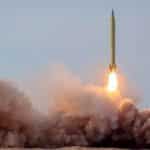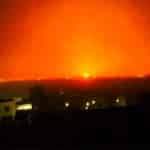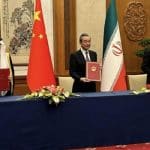Tehran did not seek to attack the Israeli civilian population, but to test the IDF defenses. For the first time, it used hypersonic missiles that neither Israel's allies nor its army were able to intercept.
he expected Iranian retaliation had been widely telegraphed 72 hours in advance and even calibrated, according to the Financial Times, for fear of soaring oil prices.
Larry Johnson, a former CIA agent, noted that despite the West's insistence that Iran is failing - the song of Western "grooms", whose multimedia is largely controlled by the "Israeli lobby" - Iran carried out what it planned to do in Israel and demonstrated a remarkably sophisticated capability, with maneuverable warheads.
Israel's most popular newspaper, Yediot Aharonot, criticized Israel's strategic failure, while the Washington Times denounced the Biden administration's "deterrence failure" in preventing conflict between Iran and Israel.
Hayman Tamir, director of the Israeli think tank Institute for National Security Studies (INSS), said Iran was able to cause damage to Israel without the United States engaging in a counterattack - this which Prime Minister Netanyahu would have strongly wished for.
Ilya Tsukanov of Sputnik – media outlet of Russia, one of the two hypersonic missile superpowers, in unison with China – reports that Iranian multimedia confirms the use of undetectable hypersonic missiles.
As for the Iranian channel PressTV, it showed, with supporting video, that all the hypersonic missiles used succeeded in reaching their targets: the very important air bases of Nevatim, where the F-35s are installed, and of Ramon, very close to the clandestine nuclear power plant of Dimona.
PressTV says Iran is among a handful of countries that possess the technology to produce hypersonic missiles capable of traveling at astonishing speeds and hitting their targets with great precision.
Other Iranian sources claim that its hypersonic missiles (Fattah 2) hit a secret Mossad military base in the Syrian Golan Heights, which belongs to Syria and was annexed by Israel - reportedly costing 44 lives ( sic) spies - and even hit a Mossad building in Tel Aviv.
Beyond the propaganda war dominated by the "Israeli lobby" in the West, which extols the exploit of Israel, helped by the United States, the United Kingdom, France and even Jordan, of having destroyed 99% (sic) of Iran's array of drones/cruise missiles/ballistic missiles, former US Marine spy officer Scott Ritter - who famously debunked Baby Bush and weapons nonsense of mass destruction of Saddam Hussein which never existed - asserts that "Iran has reestablished deterrence" (from the Latin deterrere, to deter by terror) so as to now keep Israel and the United States in check, while Israel thought it could launch an attack on Iran without having to suffer the consequences. This is now done, even if Iran deliberately did not inflict excessively murderous action on Israel. It was a message of deterrence, not an attack!
I have been writing about Iran for over twenty years. In 2005, I took a trip to Iran to verify the "ground truth" about that country, a truth that I later incorporated into a book, "Target Iran," exposing U.S.-Israeli collaboration to develop a rationale of a military attack on Iran intended to bring down its theocratic government. I followed this book with another, “Dealbreaker,” in 2018, which updates this U.S.-Israeli effort.
In November 2006, in a speech at Columbia University's School of International Relations, I emphasized that the United States would never abandon my "good friend" Israel, until, of course, , we do it. What could precipitate such action, I asked? I pointed out that Israel was a country drunk on pride and power, and that unless the United States found a way to remove the keys from the ignition of the bus that Israel was driving to abyss, we would not join Israel on its lemming-like suicidal journey.
The following year, in 2007, in a speech to the American Jewish Committee, I pointed out that my criticisms of Israel (which many in the audience took great offense to) came from a concern for the future of Israel. I highlighted the fact that I had spent the better part of a decade trying to protect Israel from Iraqi missiles, both during my service in Desert Storm, where I played a role in the campaign to counter against SCUD missiles, and as a United Nations weapons inspector, where I worked with Israeli intelligence to ensure that Iraqi SCUD missiles were eliminated.
“The last thing I want to see,” I told the crowd, “is a scenario in which Iranian missiles hit Israeli soil. But unless Israel changes course, this is the inevitable result of a policy dictated more by arrogance than common sense.”
On the night of April 13 to 14, 2024, my fears came true live in front of an international audience: Iranian missiles fell on Israel and the latter could do nothing to stop them. As had been the case just over 33 years earlier, when Iraqi SCUD missiles overcame American and Israeli Patriot missile defenses to strike Israel dozens of times in the space of a month and a half, Iranian missiles, part of an attack plan designed to overwhelm Israeli missile defense systems, struck designated targets inside Israel with impunity.
Despite the use of a large integrated missile defense system consisting of the so-called "Iron Dome" system, US-made Patriot missile batteries and Arrow and David's Sling missile interceptors, as well as US aircraft , British and Israeli and American and French on-board missile defenses, more than a dozen Iranian missiles struck heavily protected Israeli airfields and air defense installations.
The Iranian missile attack on Israel was not launched out of the blue, so to speak, but rather in retaliation for the April 1 Israeli attack on the Iranian consulate in Damascus, Syria, which killed several senior Iranian military commanders. Although Israel has previously carried out attacks against Iranian personnel inside Syria, the April 1 attack was notable not only for the deaths of top Iranian officials, but also for the fact that it struck what was legally speaking sovereign Iranian territory – the Iranian consulate.
From the Iranian point of view, the attack on the consulate constituted a red line which, in the absence of retaliation, would erase any notion of deterrence, opening the way to even bolder Israeli military action, possibly going as far as direct attacks against Iran. The retaliation, however, is balanced by a complex set of interlocking policy objectives that would likely be challenged by the type of large-scale conflict between Israel and Iran that could be precipitated by a significant Iranian retaliatory attack on Israel.
First, Iran has engaged in a strategic policy based on a pivot away from Europe and the United States and toward Russia, China, and the Eurasian landmass. This change is due to Iran's frustration with the economic sanctions policy led by the United States and the inability and/or lack of will on the part of the collective West to find a path that would allow to lift these sanctions. The failure of the Iran nuclear deal (the Joint Comprehensive Plan of Action, or JCPOA) to produce the type of economic opportunities that were promised when it was signed has been a major driver of this Iranian pivot toward 'East. Instead, Iran joined the Shanghai Cooperation Organization (SCO) and the BRICS forum and devoted its diplomatic energy to the full and productive integration of Iran into these two groups.
A general war with Israel would undermine these efforts.
Iran responded forcefully to Israeli aggression against its embassy in Damascus by carrying out a historic military operation. This response caught Israel off guard and placed Iran in the history book.
On the night of April 13-14, Iran launched a major offensive on Israeli soil that lasted at least five hours, demonstrating its ability to deploy high-tech Shahed drones and Kheibar missiles capable of traveling more than 1 km. This show of force took the Jewish state by surprise and sowed panic among the population.
This attack comes in response to an Israeli assault on the consular section of the Iranian embassy in Damascus, considered a violation of Iranian sovereign territory. According to Article 51 of the United Nations Charter, this Iranian response is legitimate and in accordance with international law.
According to the Chinese newspaper "Global Times", in response to the failure of international organizations, particularly the UN Security Council, to condemn Israeli attacks on Iranian diplomatic facilities, Iran retaliated using intelligence strategic weapons, missiles and drones to successfully destroy major military targets in Israel.
Western countries condemned the Iranian attack. The United States had asked Iran to immediately stop its attack, but Tehran had not only ignored this request, but also threatened to bomb American bases if the White House intervened.
And a big blow for the Zionist entity, according to CNN, the President of the United States, Joe Biden informed the Israeli Prime Minister, Benyamin Netanyahu by telephone that the United States would not participate in offensive operations against Iran.
For his part, the Deputy Speaker of the Russian State Duma, Pyotr Olegovich Tolstoy, expressed his support for Iran on Twitter by publishing a poem praising the friendship between the two countries and their struggle common for a noble cause.
According to sources from the American television channel ABC, the Iranian attack involved 400 to 500 drones and around 150 missiles. The drones were launched from Iran's western provinces, while the Houthis launched drones from Yemen and missile strikes from Hezbollah units based in Lebanon. The perfect coordination between these countries demonstrated an incredible ability to respond effectively to the Zionist entity, which failed to stop all missiles with its missile defense system, known as Iron Dome.
It is nevertheless already certain that this is a major event which will have implications far beyond the Middle East. In a few months, the Chinese “method” will have succeeded where that of the Americans and Europeans failed for ten years with the Iranian nuclear agreement. This may herald a new era of conflict resolution with the key words: non-interference, respect for sovereignty and cultures, consideration of economic interests, versus, “our values”, carrot and stick of sanctions.
A concrete agreement
While this agreement no doubt marks the marginalization of Washington throughout the Middle East, American experts have greeted the news with surprising magnanimity. "This is not a setback for the United States"; "The fact that Tehran and Riyadh somehow decided to bury the hatchet is good for everyone." They thus illustrate the maxim: “Since these mysteries are beyond us, let us pretend to be their organizers. »
In the New York Times, Yun Sun, an expert on China at the Stimson center, a think tank located in Washington DC, nevertheless minimizes its scope: "The differences between Saudi Arabia and Iran are deep and sectarian, and it will take more than a resumption of diplomatic relations to restore ties. China's role in getting the deal done may not be as critical as it seems, given that Iran and Saudi Arabia were already motivated to get a deal done . »
However, this agreement appears extremely solid and the central role of China is difficult to dispute.
King Salman has just invited the Iranian president to Riyadh to seal their alliance. The statement formalizing the resumption of relations was made public in Beijing on March 10, the day Xi Jinping was solemnly invested, after the vote of parliament, for a third term. This date was obviously not chosen at random. It is a strong symbol that shows the personal involvement of the Chinese head of state who cannot have taken the risk of losing face by sponsoring a lame pact. Moreover, even if discussions between the two parties had already taken place in 2021 and 2022 in Oman and Iraq, China has largely participated in their concretization. With in particular the three summits organized during Xi Jinping's visit to Riyadh in December 2022: "China/Gulf countries" "China/Arab countries" "China/Saudi Arabia" and the Iranian president's visit to Beijing last February.


 Iranian hypersonic missiles establish deterrence through terror
Iranian hypersonic missiles establish deterrence through terror
 April's missiles
April's missiles
 Iran hits hard
Iran hits hard
